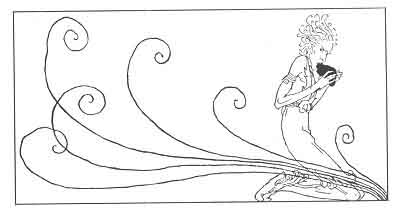
The Children of Odin by Padraic Colum
Index | Previous | NextPART III THE WITCH'S HEART

1. FOREBODING IN ASGARD
WHAT happened afterwards is to the shame of the Gods, and mortals may hardly speak of it. Gulveig the Witch came into Asgard, for Heimdall might not forbid her entrance. She came within and she had her seat amongst the Æsir and the Vanir. She walked through Asgard with a smile upon her face, and where she walked and where she smiled Care and dire Foreboding came.
Those who felt the care and the foreboding most deeply were Bragi the Poet and his wife, the fair and simple Iduna, she who gathered the apples that kept age from the Dwellers in Asgard. Bragi ceased to tell his never-ending tale. Then one day, overcome by the fear and the foreboding that was creeping through Asgard, Iduna slipped down Ygdrassil, the World Tree, and no one was left to pluck the apples with which the Æsir and the Vanir stayed their youth.
Then were all the Dwellers in Asgard in sore dismay. Strength and beauty began to fade from all. Thor found it hard to lift Miölnir, his great hammer, and the flesh under Freya's necklace lost its white radiance. And still Gulveig the Witch walked smiling through Asgard, although now she was hated by all.
It was Odin and Frey who went in search of Iduna. She would have been found and brought back without delay if Frey had had with him the magic sword that he had bartered for Gerda. In his search he had to strive with one who guarded the lake wherein Iduna had hidden herself. Beli was the one he strove against. He overcame him in the end with a weapon made of stags' antlers. Ah, it was not then but later that Frey lamented the loss of his sword: it was when the Riders of Muspell came against Asgard, and the Vanir, who might have prevailed, prevailed not because of the loss of Frey's sword.
They found Iduna and they brought her back. But still Care and Foreboding crept through Asgard. And it was known, too, that the witch Gulveig was changing the thoughts of the Gods.
At last Odin had to judge Gulveig. He judged her and decreed her death. And only Gungnir, the spear of Odin, might slay Gulveig, who was not of mortal race.
Odin hurled Gungnir. The spear went through Gulveig. But still she stood smiling at the Gods. A second time Odin hurled his spear. A second time Gungnir pierced the witch. She stood livid as one dead but fell not down. A third time Odin hurled his spear. And now, pierced for the third time, the witch gave a scream that made all Asgard shudder and she fell in death on the ground.
"I have slain in these halls where slaying is forbidden," Odin said. "Take now the corpse of Gulveig and burn it on the ramparts, so that no trace of the witch who has troubled us will remain in Asgard."
They brought the corpse of Gulveig the witch out on the ramparts and they lighted fires under the pile on which they laid her and they called upon Hræsvelgur to fan up the flame:

Hræsvelgur is the Giant,
Who on heaven's edge sits
In the guise of an eagle;
And the winds, it is said,
Rush down on the earth
From his outspreading pinions.
Far away was Loki when all this was being done. Often now he went from Asgard, and his journeys were to look upon that wondrous treasure that had passed from the keeping of the Dwarf Andvari.
It was Gulveig who had kept the imagination of that treasure within his mind. Now, when he came back and heard the whispers of what had been done, a rage flamed up within him.
For Loki was one of those whose minds were being changed by the presence and the whispers of the witch Gulveig. His mind was being changed to hatred of the Gods.
Now he went to the place of Gulveig's burning. All her body was in ashes, but her heart had not been devoured by the flames. And Loki in his rage took the heart of the witch and ate it. Oh, black and direful was it in Asgard, the day that Loki ate the heart that the flames would not devour!